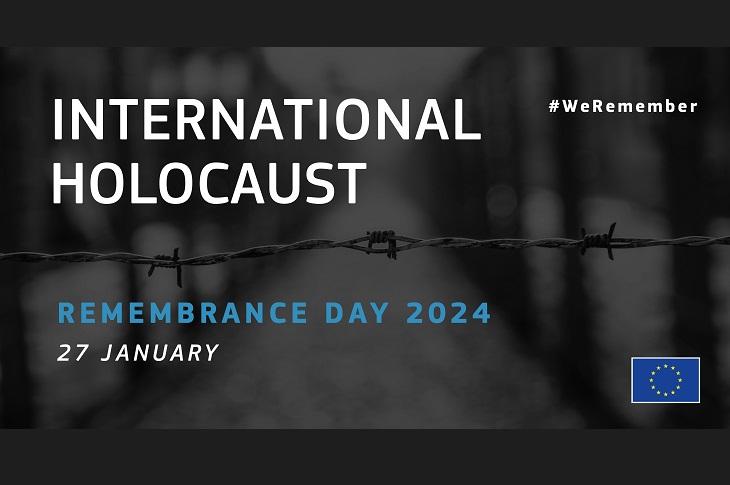
27 January marks the International Holocaust Remembrance Day and the 79th anniversary of the liberation of the Nazi concentration camp Auschwitz-Birkenau. Ahead of the International Holocaust Remembrance Day, President von der Leyen said:
“Following the despicable terrorist attacks by Hamas against Israel on 7 October 2023, remembering the Holocaust has taken on a new meaning. European Jews are living again in fear: no parent should be afraid to send their children to school. Jewish people are bullied, harassed, and attacked on the street, in school and university. Synagogues have been vandalised. Jewish cemeteries have been desecrated.
The unprecedented spike of antisemitic acts we have seen all over Europe reminds us of the darkest time of our history. What is different now, however, is that we all stand with the Jewish communities. There is no place for antisemitic hatred, especially here in Europe. And there is no justification to antisemitism.
Three generations after the Shoah, we must ensure that Jewish life continues to thrive in public. We cannot accept that Jews are hiding their identity. Fostering Jewish life is at the heart of our EU Strategy on combating antisemitism. As we mark this year the 79th anniversary of the liberation of the concentration camp of Auschwitz-Birkenau, we shall remember the 6 million Jewish women, men and children, and all other victims, among them hundreds of thousands of Roma, murdered during the Holocaust.
As the last Holocaust survivors are passing away, we must find new forms of remembrance and implement new methods of teaching, using the last traces of the past. To do so, we are developing a ‘Network of Places Where the Holocaust Happened', a flagship action of the EU Strategy on combating antisemitism. Places of memory need to be safeguarded and serve educational and remembrance purposes.
We must remember how it all started: antisemitism and hatred led to the Shoah. It is our duty, as Europeans, to build a European Union free from antisemitism and any form of racism and discrimination. If Europe fails the Jews, Europe will have failed us all. Never again is now!”
Background
The European Commission put forward the first-ever strategy on combatting antisemitism and fostering Jewish life on 5 October 2021, to support EU countries and civil society in their fight against antisemitism and fostering Jewish life in the EU. Holocaust remembrance is an essential pillar of efforts to ensure that we never forget our history.
The European Commission put forward a communication entitled “No place for hate: a Europe united against hatred” on 6 November 2023, stepping up the protection of public spaces, in particular Jewish places of worship, and the fight against hatred online. The Commission's Coordinator on combatting antisemitism and fostering Jewish life will be upgraded to Envoy, who will have a specific mandate to deepen coordination, including through specific EU funded projects, and to maximise the potential of EU policies to combat hatred, online and offline.
The 2008 Framework Decision on Combating Racism and Xenophobia ensures that serious manifestations of racism and xenophobia are punishable by effective, proportionate and dissuasive criminal sanctions – this includes publicly condoning, denying or trivialising the Holocaust. The Commission is also taking important measures to stop the spread of disinformation about the Holocaust, online and offline.
To raise awareness and counter Holocaust distortion, the Commission has launched a global campaign to #ProtectTheFacts, together with the International Holocaust Remembrance Alliance (IHRA), UNESCO, OSCE, the Council of Europe and the United Nations.
In 2005, the United Nations General Assembly Resolution on the Holocaust Remembrance (60/7) designated 27 January as the international commemoration day in memory of the victims of the Holocaust. On 27 January 1945, the Allied Forces liberated the concentration and death camp of Auschwitz-Birkenau. The resolution urges every member of the United Nations to honour the memory of Holocaust victims and encourage the development of educational programs about Holocaust history, to prevent future acts of genocide. It calls for the active preservation of Holocaust sites such as Nazi death camps, concentration camps, forced labour camps and prisons.
The European Commission and EU Member States have committed to work against antigypsyism as part of the EU Roma Strategic Framework and the Council Recommendation on Roma. A first assessment report of the Member States' National Roma Strategic Frameworks was adopted on 9 January 2023.
As part of the Citizens, Equality, Rights and Vales (CERV) Programme, in 2024 the European Commission will provide over €14 million of EU funding to support projects on European Remembrance. A particular priority will be given to projects that aim to strengthen Holocaust remembrance, education and research or combat Holocaust denial and distortion.
For More Information
Details
- Publication date
- 26 January 2024
- Author
- Directorate-General for Neighbourhood and Enlargement Negotiations
